一般过去时动词不规则变化表分类
动词的各种时态及变化规则
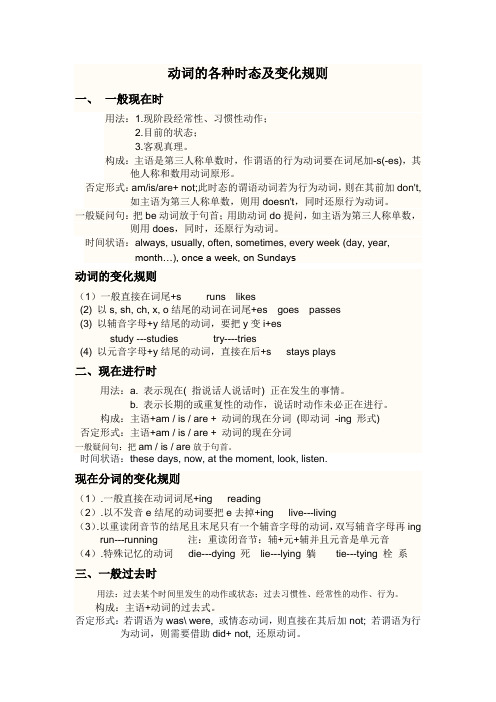
动词的各种时态及变化规则一、一般现在时用法:1.现阶段经常性、习惯性动作;2.目前的状态;3.客观真理。
构成:主语是第三人称单数时,作谓语的行为动词要在词尾加-s(-es),其他人称和数用动词原形。
否定形式:am/is/are+ not;此时态的谓语动词若为行为动词,则在其前加don't,如主语为第三人称单数,则用doesn't,同时还原行为动词。
一般疑问句:把be动词放于句首;用助动词do提问,如主语为第三人称单数,则用does,同时,还原行为动词。
时间状语:always, usually, often, sometimes, every week (day, year,month…), once a week, on Sundays动词的变化规则(1)一般直接在词尾+s runs likes(2) 以s, sh, ch, x, o结尾的动词在词尾+es goes passes(3) 以辅音字母+y结尾的动词,要把y变i+esstudy ---studies try----tries(4) 以元音字母+y结尾的动词,直接在后+s stays plays二、现在进行时用法:a. 表示现在( 指说话人说话时) 正在发生的事情。
b. 表示长期的或重复性的动作,说话时动作未必正在进行。
构成:主语+am / is / are + 动词的现在分词(即动词-ing 形式)否定形式:主语+am / is / are + 动词的现在分词一般疑问句:把am / is / are放于句首。
时间状语:these days, now, at the moment, look, listen.现在分词的变化规则(1).一般直接在动词词尾+ing reading(2).以不发音e结尾的动词要把e去掉+ing live---living(3).以重读闭音节的结尾且末尾只有一个辅音字母的动词,双写辅音字母再ing run---running 注:重读闭音节:辅+元+辅并且元音是单元音(4).特殊记忆的动词die---dying 死lie---lying 躺tie---tying 栓系三、一般过去时用法:过去某个时间里发生的动作或状态;过去习惯性、经常性的动作、行为。
(完整版)动词过去式分词不规则变化表完整版
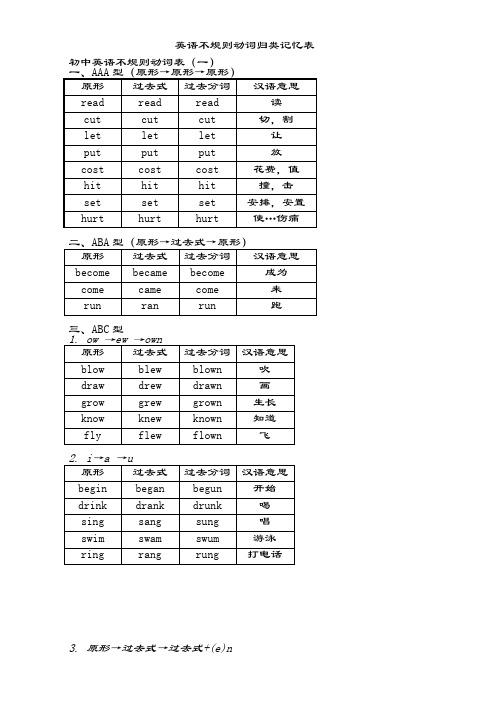
burn
burned
burned
烧
burnt
burnt
smell
smelled
smelled
闻
smelt
smelt
shine
shined
shined
照耀
shone
shone
dream
dreamed
dreamed
做梦
dreamt
dreamt
wake
waked
waked
醒
woke
woken
hide
给…看
sing
sang
sung
唱
sit
sat
sat
坐
sleep
slept
slept
睡
smell
smelled
smelled
闻
smell
smelt
smelt
闻
speak
spoke
spoken
说
spell
spelled
spelled
拼写
spell
spelt
spelt
拼写
spend
spent
spent
花费
did
done
做
draw
drew
drawn
画
dream
dreamed
dreamed
做梦
dream
dreamt
dreamt
做梦
drink
drank
drunk
喝
drive
drove
driven
驾驶
eat
ate
eaten
过去式的变化不规则表
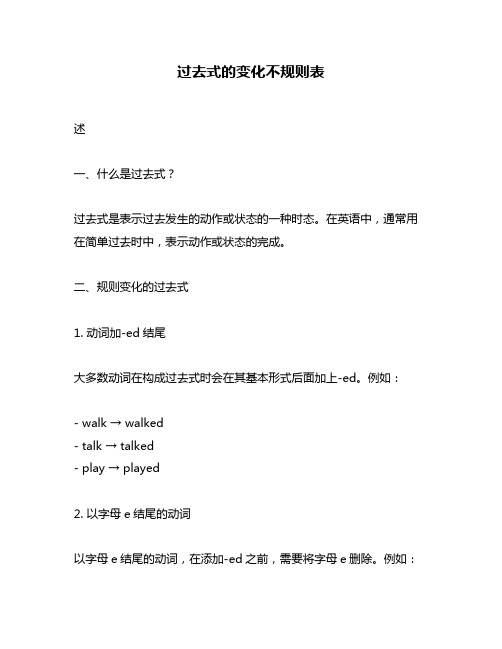
过去式的变化不规则表述一、什么是过去式?过去式是表示过去发生的动作或状态的一种时态。
在英语中,通常用在简单过去时中,表示动作或状态的完成。
二、规则变化的过去式1. 动词加-ed结尾大多数动词在构成过去式时会在其基本形式后面加上-ed。
例如:- walk → walked- talk → talked- play → played2. 以字母e结尾的动词以字母e结尾的动词,在添加-ed之前,需要将字母e删除。
例如:- love → loved- dance → danced- bake → baked3. 以辅音字母+y结尾的动词以辅音字母+y结尾的动词,在添加-ed之前,需要将y变成i。
例如:- study → studied- try → tried- cry → cried4. 双写辅音字母结尾的动词如果一个单词以一个辅音字母结尾,并且在这个辅音字母之前只有一个元音字母,则需要双写这个辅音字母,并且再加上-ed。
例如:- stop → stopped- plan → planned- prefer → preferred5. 不规则变化的过去式动词有一些常用动词不遵循以上规则,它们有自己独特的过去式形式。
例如:- be → was/were- have → had- do → did- go → went- see → saw三、不规则变化的过去式动词列表以下是一些常用的不规则变化的过去式动词列表:1. be- I was- You were- He/she/it was- We were- They were2. have- I had- You had- He/she/it had - We had- They had3. do- I did- You did- He/she/it did - We did- They did4. go- I went- You went- He/she/it went - We went- They went5. see- I saw- You saw- He/she/it saw - We saw- They saw6. come- I came- You came- He/she/it came - We came- They came 7. give- I gave- You gave- He/she/it gave - We gave- They gave8. take- I took- You took- He/she/it took - We took- They took9. make- I made- You made- He/she/it made - We made- They made 10. know- I knew- You knew- He/she/it knew - We knew–They knew四、注意事项1. 不规则动词的过去式需要记忆,因为它们没有任何规律可循。
小学一般过去时及动词过去式变化规则及不规则形式
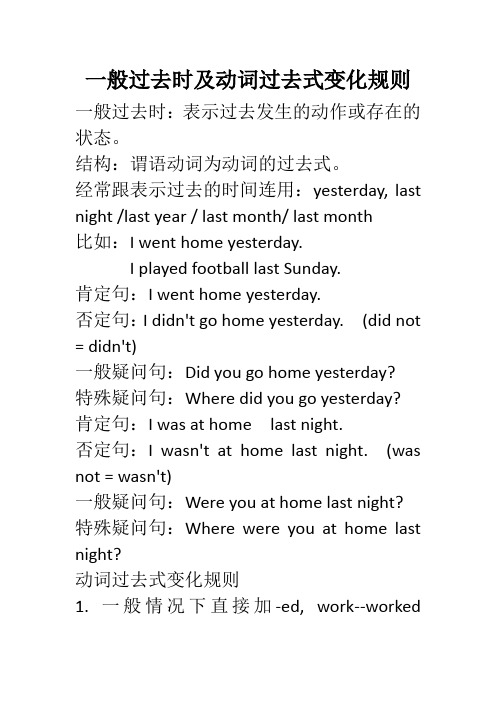
一般过去时及动词过去式变化规则一般过去时:表示过去发生的动作或存在的状态。
结构:谓语动词为动词的过去式。
经常跟表示过去的时间连用:yesterday, last night /last year / last month/ last month比如:I went home yesterday.I played football last Sunday.肯定句:I went home yesterday.否定句:I didn't go home yesterday. (did not = didn't)一般疑问句:Did you go home yesterday?特殊疑问句:Where did you go yesterday?肯定句:I was at home last night.否定句:I wasn't at home last night. (was not = wasn't)一般疑问句:Were you at home last night?特殊疑问句:Where were you at home last night?动词过去式变化规则1. 一般情况下直接加-ed, work--workedwalk-- walked help--helped play--played2. 以不发音的字母e结尾的动词,加d, dance--danced like-liked3. 以重读闭音节结尾,而且结尾只有一个辅音字母,双写这个辅音字母,再加ed, plan--planned, stop--stopped, shop--shopped4. 以辅音字母加y结尾的动词,把y变成i,再加ed, try-- tried, study--studied5. 不规则动词的变化:take--took, have--had, see--saw, draw--drew, come--came, give--gave, sit--sat, sing--sang, swim--swam, drink--drank, run--ran, put --put read--read, buy--bought, am/is--was are--were , do --did, go --went, make---made。
八年级动词不规则变化表
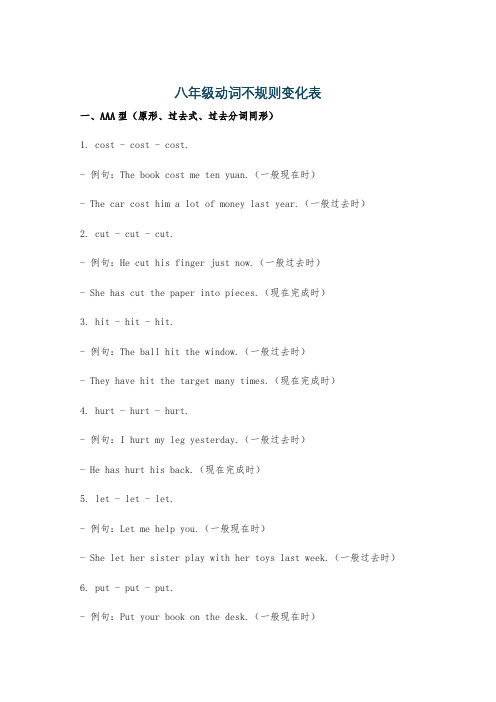
八年级动词不规则变化表一、AAA型(原形、过去式、过去分词同形)1. cost - cost - cost.- 例句:The book cost me ten yuan.(一般现在时)- The car cost him a lot of money last year.(一般过去时)2. cut - cut - cut.- 例句:He cut his finger just now.(一般过去时)- She has cut the paper into pieces.(现在完成时)3. hit - hit - hit.- 例句:The ball hit the window.(一般过去时)- They have hit the target many times.(现在完成时)4. hurt - hurt - hurt.- 例句:I hurt my leg yesterday.(一般过去时)- He has hurt his back.(现在完成时)5. let - let - let.- 例句:Let me help you.(一般现在时)- She let her sister play with her toys last week.(一般过去时)6. put - put - put.- 例句:Put your book on the desk.(一般现在时)- He put on his coat and went out.(一般过去时)7. read - read - read.- 注意:read的过去式和过去分词读音为[red]。
- 例句:I read a book yesterday.(一般过去时)- She has read this novel three times.(现在完成时)二、ABA型(原形与过去分词同形)1. become - became - become.- 例句:He became a teacher last year.(一般过去时)- She has become very popular.(现在完成时)2. come - came - come.- 例句:He came to school late yesterday.(一般过去时)- They have come to realize the importance of English.(现在完成时)3. run - ran - run.- 例句:He ran very fast in the race.(一般过去时)- She has run out of money.(现在完成时)三、ABB型(过去式与过去分词同形)1. bring - brought - brought.- 例句:He brought his book to school yesterday.(一般过去时)- She has brought some flowers for her mother.(现在完成时)2. build - built - built.- 例句:They built a house last year.(一般过去时)- The workers have built many tall buildings in this city.(现在完成时)3. buy - bought - bought.- 例句:I bought a new pen yesterday.(一般过去时)- She has bought a lot of clothes this month.(现在完成时)4. catch - caught - caught.- 例句:The police caught the thief last night.(一般过去时)- He has caught a cold.(现在完成时)5. dig - dug - dug.- 例句:They dug a hole in the garden.(一般过去时)- The workers have dug a well.(现在完成时)6. feel - felt - felt.- 例句:I felt very happy yesterday.(一般过去时)- She has felt much better since she took the medicine.(现在完成时)7. fight - fought - fought.- 例句:They fought against the enemy bravely.(一般过去时)- The soldiers have fought for their country.(现在完成时)8. find - found - found.- 例句:He found his wallet under the bed.(一般过去时)- She has found a new job.(现在完成时)9. get - got - got/gotten.- 例句:I got a letter from my friend yesterday.(一般过去时)- He has got a lot of knowledge from books.(现在完成时,美式英语常用gotten)10. hang - hung - hung(悬挂);hang - hanged - hanged(绞死、吊死)- 例句:He hung a picture on the wall.(一般过去时,悬挂)- The murderer was hanged.(一般过去时,绞死)11. have - had - had.- 例句:I had a great time yesterday.(一般过去时)- She has had a lot of experience.(现在完成时)12. hear - heard - heard.- 例句:I heard a strange noise last night.(一般过去时)- He has heard the news already.(现在完成时)13. hold - held - held.- 例句:He held a meeting yesterday.(一般过去时)- She has held this position for a long time.(现在完成时)14. keep - kept - kept.- 例句:He kept his promise.(一般过去时)- She has kept this book for two weeks.(现在完成时)15. lay - laid - laid.- 例句:She laid the baby on the bed.(一般过去时)- The hen has laid many eggs.(现在完成时)16. lead - led - led.- 例句:He led the team to victory.(一般过去时)- She has led a hard life.(现在完成时)17. leave - left - left.- 例句:He left school early yesterday.(一般过去时)- She has left her hometown.(现在完成时)18. lend - lent - lent.- 例句:I lent him my book yesterday.(一般过去时)- She has lent some money to her friend.(现在完成时)19. lose - lost - lost.- 例句:He lost his keys yesterday.(一般过去时)- She has lost her way.(现在完成时)20. make - made - made.- 例句:He made a model plane yesterday.(一般过去时)- She has made a lot of friends.(现在完成时)21. mean - meant - meant.- 例句:What did he mean?(一般过去时)- This word has meant different things in different contexts.(现在完成时)22. meet - met - met.- 例句:I met my old friend in the street yesterday.(一般过去时)- She has met many difficulties.(现在完成时)23. pay - paid - paid.- 例句:He paid ten yuan for the book.(一般过去时)- She has paid all her debts.(现在完成时)24. say - said - said.- 例句:He said he was happy.(一般过去时)- She has said goodbye to her parents.(现在完成时)25. sell - sold - sold.- 例句:He sold his old bike yesterday.(一般过去时)- She has sold all her paintings.(现在完成时)26. send - sent - sent.- 例句:I sent a letter to my mother yesterday.(一般过去时)- She has sent some gifts to her friends.(现在完成时)27. shine - shone - shone(发光、照耀);shine - shined - shined(擦亮)- 例句:The sun shone brightly yesterday.(一般过去时,发光)- He shined his shoes this morning.(一般过去时,擦亮)28. sit - sat - sat.- 例句:He sat on the chair.(一般过去时)- She has sat here for an hour.(现在完成时)29. sleep - slept - slept.- 例句:I slept well last night.(一般过去时)- She has slept for ten hours.(现在完成时)30. smell - smelt - smelt(也可smelled - smelled)- 例句:The flowers smelt sweet.(一般过去时)- The food has smelt strange.(现在完成时)31. speak - spoke - spoken.- 例句:He spoke at the meeting yesterday.(一般过去时)- She has spoken English for many years.(现在完成时)32. spell - spelt - spelt(也可spelled - spelled)- 例句:He spelt the word wrong.(一般过去时)- She has spelt this word correctly.(现在完成时)33. spend - spent - spent.- 例句:He spent two hours doing his homework yesterday.(一般过去时)- She has spent a lot of money on clothes.(现在完成时)34. stand - stood - stood.- 例句:He stood at the door.(一般过去时)- She has stood there for a long time.(现在完成时)35. sweep - swept - swept.- 例句:She swept the floor yesterday.(一般过去时)- They have swept the classroom.(现在完成时)36. teach - taught - taught.- 例句:He taught us English last year.(一般过去时)- She has taught in this school for five years.(现在完成时)37. tell - told - told.- 例句:He told me a story yesterday.(一般过去时)- She has told the truth.(现在完成时)38. think - thought - thought.- 例句:I thought he was right.(一般过去时)- She has thought about this problem.(现在完成时)39. understand - understood - understood.- 例句:I understood his meaning.(一般过去时)- She has understood the situation.(现在完成时)40. win - won - won.- 例句:Our team won the game yesterday.(一般过去时)- He has won many prizes.(现在完成时)四、ABC型(原形、过去式、过去分词都不同形)1. be - was/were - been.- 例句:I was at home yesterday.(一般过去时,第一人称单数)- They were at school last week.(一般过去时,第三人称复数)- She has been to Beijing.(现在完成时)2. begin - began - begun.- 例句:He began to study English last year.(一般过去时)- She has begun a new project.(现在完成时)3. blow - blew - blown.- 例句:The wind blew strongly yesterday.(一般过去时)- The leaves have been blown away.(现在完成时,被动语态)4. break - broke - broken.- 例句:He broke the window yesterday.(一般过去时)- The cup has been broken.(现在完成时,被动语态)5. choose - chose - chosen.- 例句:He chose a red pen.(一般过去时)- She has chosen to study abroad.(现在完成时)6. do - did - done.- 例句:I did my homework yesterday.(一般过去时)- She has done a lot of work.(现在完成时)7. draw - drew - drawn.- 例句:He drew a picture yesterday.(一般过去时)- She has drawn many beautiful pictures.(现在完成时)8. drink - drank - drunk.- 例句:He drank a glass of water just now.(一般过去时)- She has drunk too much wine.(现在完成时)9. drive - drove - driven.- 例句:He drove to work this morning.(一般过去时)- She has driven for three hours.(现在完成时)10. eat - ate - eaten.- 例句:I ate an apple yesterday.(一般过去时)- She has eaten her lunch.(现在完成时)11. fall - fell - fallen.- 例句:He fell off his bike yesterday.(一般过去时)- Leaves have fallen from the trees.(现在完成时)12. fly - flew - flown.- 例句:The bird flew away.(一般过去时)- She has flown to Paris.(现在完成时)13. forget - forgot - forgotten.- 例句:I forgot my book yesterday.(一般过去时)- He has forgotten his password.(现在完成时)14. give - gave - given.- 例句:He gave me a book yesterday.(一般过去时)- She has given a lot of help to others.(现在完成时)15. go - went - gone.- 例句:He went to the park yesterday.(一般过去时)- She has gone to Shanghai.(现在完成时,表示“去了还没回来”)16. grow - grew - grown.- 例句:The tree grew taller last year.(一般过去时)- She has grown into a beautiful girl.(现在完成时)17. know - knew - known.- 例句:I knew him two years ago.(一般过去时)- She has known the truth.(现在完成时)18. lie - lay - lain(躺、位于);lie - lied - lied(说谎)- 例句:He lay on the bed all day yesterday.(一般过去时,躺)- The town lies by the river.(一般现在时,位于)- He lied to me.(一般过去时,说谎)- She has lied many times.(现在完成时,说谎)19. ride - rode - ridden.- 例句:He rode a horse yesterday.(一般过去时)- She has ridden a bike for years.(现在完成时)20. ring - rang - rung.- 例句:The bell rang just now.(一般过去时)- She has rung the doorbell.(现在完成时)21. rise - rose - risen.- 例句:The sun rose early this morning.(一般过去时)- The price has risen.(现在完成时)22. run - ran - run.- 例句:He ran to school this morning.(一般过去时)- She has run in the park for a long time.(现在完成时)23. see - saw - seen.- 例句:I saw a movie yesterday.(一般过去时)- She has seen the Great Wall.(现在完成时)24. show - showed - shown/showed.- 例句:He showed me his new phone yesterday.(一般过去时)- She has shown great interest in art.(现在完成时)25. sing - sang - sung.- 例句:She sang a song yesterday.(一般过去时)- He has sung this song many times.(现在完成时)26. sink - sank - sunk.- 例句:The ship sank last night.(一般过去时)- The stone has sunk to the bottom of the river.(现在完成时)27. speak - spoke - spoken.- 例句:He spoke at the meeting yesterday.(一般过去时)- She has spoken English for many years.(现在完成时)28. steal - stole - stolen.- 例句:The thief stole my wallet yesterday.(一般过去时)- He has stolen many things.(现在完成时)29. swim - swam - swum.- 例句:I swam in the pool yesterday.(一般过去时)- She has swum across the river.(现在完成时)30. take - took - taken.- 例句:He took my book yesterday.(一般过去时)- She has taken some photos.(现在完成时)31. throw - threw - thrown.- 例句:He threw the ball far away.(一般过去时)- She has thrown away the rubbish.(现在完成时)32. wake - woke - woken.- 例句:I woke up early this morning.(一般过去时)- She has woken the baby.(现在完成时)33. wear - wore - worn.- 例句:He wore a new shirt yesterday.(一般过去时)- She has worn this dress many times.(现在完成时)34. write - wrote - written.- 例句:I wrote a letter yesterday.(一般过去时)- She has written a book.(现在完成时)。
一般过去时的规则和不规则变化

如:
study —— studied cry —— cried
பைடு நூலகம்
carry —— carried
worry —— worried
4.重读闭音节结尾的动词末尾只有一个 辅音字母,需双写这个辅音再加-ed.
stop ___ stopped shop ___ stopped
规则动词过去式记忆口诀
过去式构成有规律 一般词尾加-ed 如词尾有个e,直接加-d就可 辅音字母y结尾,变y为i加-ed 辅音重闭结尾,双写之后加-ed
不规则动词的过去式
(1)动词原形和过去式一样 let——let read——read cost——cost put——put cut——cut hurt——hurt
(2)遇见i改为a swam sang began sat gave drank
swim sing begin sit give drink
(3)过去式以ought和aught结尾的单词 brought bought thought caught taught
bring buy think catch teach
一般过去时的规则动词和不规则动词
旅10
规则动词
1.一般的动词:直接加-ed
如:watch——watched help——helped work——worked
2.以字母e结尾的单词:加-d
如:love——loved live——lived arrive——arrived
3.以辅音字母y结尾的动词:变y为i再加-ed
(4)中间去e末尾加t
feel keep sleep
(完整版)动词变化规则表
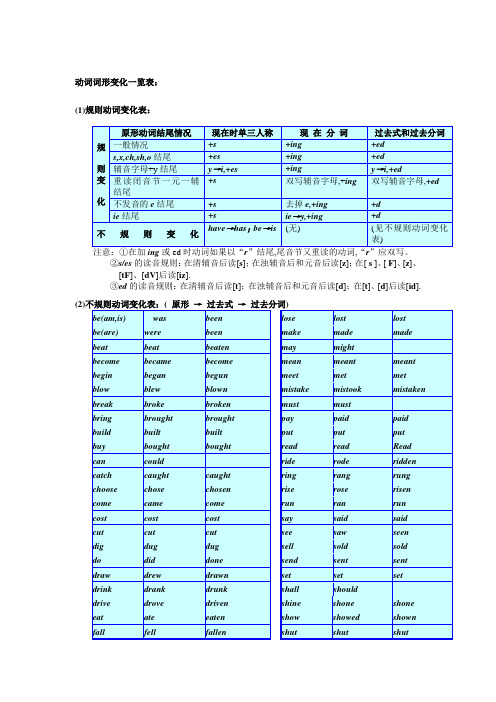
cost
say
said
said
cut
cut
cut
see
saw
seen
dig
dug
dug
sell
sold
sold
do
did
done
send
sent
sent
draw
drew
drawn
set
set
set
drink
drank
drunk
shall
should
drive
drove
driven
shine
shone
4
现在时态
一般现在时
现在进行时
一般将来时
现在完成时
谓语动词构成
动词用原形(单三加s/es)
(问句和否定句借用助词do/does)
am
is+动词-ing
are
will+动词原形
am
is +going to+动词原形
are
have+过去分词
has
过去时态
一般过去时
过去进行时
过去将来时
过去完成时
谓语动词构成
woke/waked
woken/waked
learn
learnt/learned
learnt/learned
wear
wore
worn
leave
left
left
will
would
lend
lent
lent
win
won
won
let
let
let
write
(完整版)小学英语动词过去式的变化规则
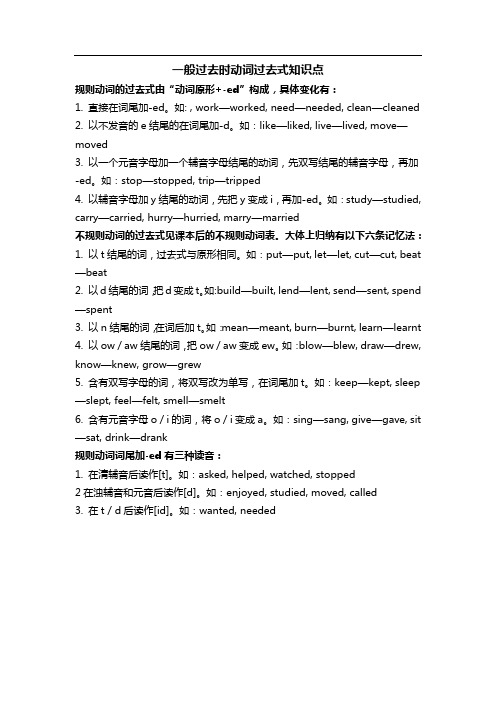
一般过去时动词过去式知识点规则动词的过去式由“动词原形+-ed”构成,具体变化有:1. 直接在词尾加-ed。
如: , work—worked, need—needed, clean—cleaned2. 以不发音的e结尾的在词尾加-d。
如:like—liked, live—lived, move—moved3. 以一个元音字母加一个辅音字母结尾的动词,先双写结尾的辅音字母,再加-ed。
如:stop—stopped, trip—tripped4. 以辅音字母加y结尾的动词,先把y变成i,再加-ed。
如:study—studied, carry—carried, hurry—hurried, marry—married不规则动词的过去式见课本后的不规则动词表。
大体上归纳有以下六条记忆法:1. 以t结尾的词,过去式与原形相同。
如:put—put, let—let, cut—cut, beat —beat2. 以d结尾的词,把d变成t。
如:build—built, lend—lent, send—sent, spend —spent3. 以n结尾的词,在词后加t。
如:mean—meant, burn—burnt, learn—learnt4. 以ow / aw结尾的词,把ow / aw变成ew。
如:blow—blew, draw—drew, know—knew, grow—grew5. 含有双写字母的词,将双写改为单写,在词尾加t。
如:keep—kept, sleep —slept, feel—felt, smell—smelt6. 含有元音字母o / i的词,将o / i变成a。
如:sing—sang, give—gave, sit —sat, drink—drank规则动词词尾加-ed有三种读音:1. 在清辅音后读作[t]。
如:asked, helped, watched, stopped2在浊辅音和元音后读作[d]。
- 1、下载文档前请自行甄别文档内容的完整性,平台不提供额外的编辑、内容补充、找答案等附加服务。
- 2、"仅部分预览"的文档,不可在线预览部分如存在完整性等问题,可反馈申请退款(可完整预览的文档不适用该条件!)。
- 3、如文档侵犯您的权益,请联系客服反馈,我们会尽快为您处理(人工客服工作时间:9:00-18:30)。
写出下列动词的过去式
is\am_________ fly_______ plant________ are ________ drink_________
play_______ go________ make ________ does_________ dance________
worry________ ask _____ taste_________ eat__________ draw________
put ______ throw________ kick_________ pass_______ do ________
二、用be动词的适当形式填空。
1. I ______ an English teacher now.
2. She _______ happy yesterday.
3. They _______ glad to see each other last month.
4. Helen and Nancy ________ good friends.
5. The little dog _____ two years old this year.
句型转换
1、Lucy did her homework at home.(改否定句)
Lucy ___________ ___________ her homework at home.
2、He found some meat in the fridge(冰箱).(变一般疑问句)
___________ he __________ ___________ meat in the fridge?
3、She stayed there for a week.(对划线部分提问)
__________ ___________ __________ she __________ there?
4、There was some orange in the cup.(变一般疑问句)
_________ there ___________ orange in the cup?
中译英。
1.我的书刚才还在手表旁_________________________________________________ 2.刚才花园里有两只小鸟。
_______________________________________________
3.. 格林先生去年住在中国。
_______________________________________________
4. 昨天我们参观了农场。
__________________________________________________
5. Jenny喜欢看书。
昨晚她看了一本英语书。
Jenny likes _________ __________. She _________ an English book last night.
用所给动词的适当形式填空。
1. I ______ (watch) a cartoon on Saturday.
2. Her father _______ (read) a newspaper last night.
3. We _________ to zoo yesterday, we _____ to the park. (go)
4. ______ you _______ (visit) your relatives last Spring Festival?
5. ______ he _______ (fly) a kite on Sunday? Yes, he ______.
6. Gao Shan _______ (pull) up carrots last National Day holiday.
7. I ____________ (sweep) the floor yesterday, but my mother ______.
8. What _________ she _________ (find) in the garden last morning?
She _________ (find) a beautiful butterfly.
9.It _________ (be) Ben’s birthday last Friday
10.10. We all _________ (have) a good time last night.。
